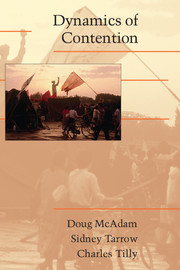Book contents
- Frontmatter
- Contents
- List of Figures and Tables
- Preface and Acknowledgments
- Abbreviations
- Part I What's the Problem?
- Part II Tentative Solutions
- Part III Applications and Conclusions
- 7 REVOLUTIONARY TRAJECTORIES
- 8 NATIONALISM, NATIONAL DISINTEGRATION, AND CONTENTION
- 9 CONTENTIOUS DEMOCRATIZATION
- 10 CONCLUSIONS
- References
- Index
9 - CONTENTIOUS DEMOCRATIZATION
Published online by Cambridge University Press: 05 June 2012
- Frontmatter
- Contents
- List of Figures and Tables
- Preface and Acknowledgments
- Abbreviations
- Part I What's the Problem?
- Part II Tentative Solutions
- Part III Applications and Conclusions
- 7 REVOLUTIONARY TRAJECTORIES
- 8 NATIONALISM, NATIONAL DISINTEGRATION, AND CONTENTION
- 9 CONTENTIOUS DEMOCRATIZATION
- 10 CONCLUSIONS
- References
- Index
Summary
Decorous Switzerland and tumultuous Mexico make an odd couple. Yet comparison of their contentious, erratic paths toward democracy contributes to linking democratization with contentious politics. It establishes that for all their difference, both Switzerland and Mexico came to the unequal degrees of democracy they now experience through intense popular contention. It shows that initial paths in one direction or another – through French-led centralization in Switzerland and popular revolution in Mexico – need not determine future directions. It underscores the fact that strikingly different itineraries toward democracy exist, with each trajectory leaving significant marks on prevailing forms of public politics. It finally identifies recurrent mechanisms that figure importantly in democratization as they do in other contentious political processes.
In Switzerland, Mexico, or anywhere else, explaining democracy requires identification of recurrent causal mechanisms that democratize a polity, plus specification of conditions that affect emergence and concatenation of those mechanisms (Tilly 2000). Most theories of democratization either stop at the specification of conditions (e.g., socioeconomic modernization) or leap to the description of how it is effected (i.e., through successful transactions among elites). This chapter identifies some broad processes (combinations and sequences of mechanisms) in the analytical space between conditions and descriptions. In particular, it identifies processes that (a) insulate public politics from prevailing categorical inequalities and/or (b) integrate trust networks into public politics. Following the precedent of previous chapters, it singles out a few mechanisms for particular attention: coalition formation across classes, central cooptation of intermediaries, dissolution of patron-client networks, and the by now familiar mechanism of brokerage.
- Type
- Chapter
- Information
- Dynamics of Contention , pp. 264 - 304Publisher: Cambridge University PressPrint publication year: 2001



